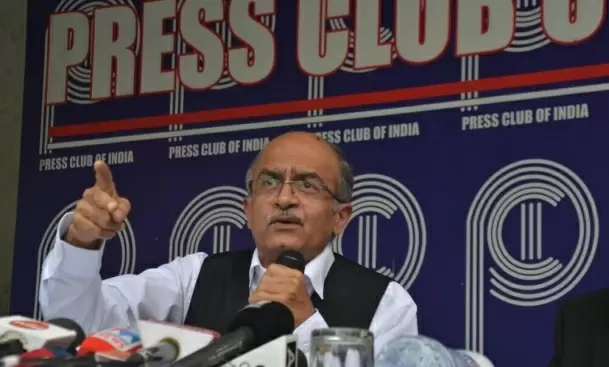Emergency considered blackest era in Indian democracy: SC
SUMIT SAXENA
| New Delhi
14-August-2020

Photo: IANS
Holding lawyer Prashant Bhushan guilty of criminal contempt of court through a tweet in June, the Supreme Court on Friday pointed out that the Emergency period is considered the blackest in the history of Indian democracy.
In a 108-page judgment, a bench comprising Justices Arun Mishra, BR Gavai and Krishna Murari said: "It is common knowledge that the Emergency era has been considered as the blackest era in the history of Indian democracy."
The bench said that "the impression which the tweet tends to give to an ordinary citizen is that when the historians in future look back, the impression they will get is that in the last six years the democracy has been destroyed in India without even a formal Emergency and that the Supreme Court had a particular role in the said destruction and the last four CJIs had more particular role in the said destruction".
The court said that the attack on judiciary has to be dealt with "requisite degree of firmness", as it "may affect the national honour and prestige in the comity of nations."
"Fearless and impartial courts of justice are the bulwarks of a healthy democracy and the confidence in them cannot be permitted to be impaired by malicious attacks upon them."
The court further observed that the "tweets based on distorted facts, in our considered view, amount to committing of criminal contempt".
Watch This TWL Video
"An attempt to shake the very foundation of constitutional democracy has to be dealt with an iron hand. The tweet has the effect of destabilising the very foundation of this important pillar of the Indian democracy," the Supreme Court added.
The top court observed that the tweet clearly tends to give an impression that the Supreme Court, which is the highest constitutional court in the country, has in the last six years played a vital role in the destruction of the Indian democracy.
The bench added that while considering whether this criticism was made in a good faith or not, the attending circumstances are also required to be taken into consideration. One of the attending circumstances is the extent of publication. "The publication by tweet reaches millions of people and, as such, such a huge extent of publication would also be one of the factors that requires to be taken into consideration while considering the question of good faith," the court added.
The court cited that Bhushan has been practicing in the Supreme Court and the Delhi High Court for the last 30 years and has consistently taken up many issues of public interest concerning the health of our democracy and its institutions, and in particular the functioning of our judiciary and its accountability.
"The alleged contemnor being part of the institution of administration of justice, instead of protecting the majesty of law, has indulged in an act which tends to bring disrepute to the institution of administration of justice," the court ruled.
The top court reminded that the Indian judiciary is not only one of the pillars on which the Indian democracy stands, but also the central pillar and that the Indian constitutional democracy stands on the bedrock of rule of law. -IANS
More Headlines
PM Narendra Modi Makes Podcast Debut with Nikhil Kamath on 'People By WTF'
Laundry Startup Revivo Secures Pre-Seed Funding For Expansion
Bajrang Dal Appeals to Ban Oyo Check-Ins for Unmarried Couples in Bengaluru
Heavy Rains Predicted In Five TN Districts On January 11
Cold Wave Grips Rajasthan: Fatehpur Hits 1.1°C, Nagaur 1.7°C
PM Narendra Modi Makes Podcast Debut with Nikhil Kamath on 'People By WTF'
Laundry Startup Revivo Secures Pre-Seed Funding For Expansion
Bajrang Dal Appeals to Ban Oyo Check-Ins for Unmarried Couples in Bengaluru
Heavy Rains Predicted In Five TN Districts On January 11
Cold Wave Grips Rajasthan: Fatehpur Hits 1.1°C, Nagaur 1.7°C










